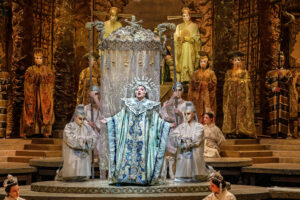
Metropolitan Opera 2023-2024 Review: Turandot
By Jennifer Pyron(Credit: Karen Almond / Met Opera)
The 350th performance of “Turandot” at the Met exceeded expectations with Ukrainian conductor Oksana Lyniv and Russian soprano Elena Pankratova making their house debuts and intentionally working together to deliver jaw-dropping moments of overwhelming musical beauty and power.
The night also featured remarkable performances by South Korean tenor SeokJong Baek, Polish soprano Aleksandra Kurzak, Ukrainian bass Vitalij Kowaljow, South Korean baritone Joo Won Kang, American tenor Tony Stevenson, American tenor Andrew Stenson, Italian tenor Carlo Bosi, Chinese bass-baritone Le Bu, Met Opera Chorus, and many note-worthy cast members. This production re-invigorated life into Puccini’s score and Franco Zeffirelli’s timeless set design.
Getting it Right
“Turandot” is an operatic work that houses contradicting themes arising from a Western projection of the East. Within the context of opera’s traditional bias, this real problem cuts to the core, leaving complexities to exist through means of entertaining exploitation and convoluting orientalism. However, the focus of this review is to further the evolution of opera by taking a look at what the Met Opera absolutely did get right for this season’s debut and that begins with the conductor, Oksana Lyniv.
Lyniv is steadily changing the course of what a female conductor can do within the industry. Her bio highlights examples of this in her career as the Music Director of Teatro Comunale di Bologna since 2022, making her the first female chief conductor of an Italian opera house. She also made history as the first female conductor in the history of the Bayreuth Festival with her debut production of “The Flying Dutchman” opening the festival in 2021. Following the sensational success of the premiere, she was committed to Bayreuth until 2024. In addition to what her bio documents, experiencing Oksana Lyniv’s work live is a whole other realm of appreciating more about what her expertise and intuitive drive can actually do when given the space to do it.
Puccini’s music for “Turandot” has exponentially influenced opera in many ways, and while it was completed posthumously after Puccini died of a heartattack in 1924, the work as a whole stands to deliver his legacy – let the music live. This being said, Lyniv’s overall accomplishment while conducting was in how she honored Puccini’s music by leading everyone with her brilliant technique and garnering unconditional support from the cast.
From the moment Lyniv stepped onto the podium and raised her arms to begin the opera, there was a definitive clarity of alignment in her posture and the orchestra’s attention. This heightened level of awareness during the opening then defined the rest of the opera. Here was a conductor working by means of extreme precision and respect. One cannot deny the power in how a conductor “conducts” themselves, and one could not deny the excitement when seeing this level of performance unfold. It was thrilling!
In addition to Lyniv’s astounding house debut performance was the exhilarating performance by soprano Elena Pankratova. All throughout the opera the two mirrored each other’s courage to lean into the music more and turn up the excitement! Just when one thought Pankratova’s voice was reaching a new height, it just kept going. Her voice literally took my breath away several times. The overwhelming intensity of Pankratova’s force was directly influenced by her unshakeable vocal technique. Her breath was so precisely measured that she could’ve easily stretched beyond where she was by the end of every phrase. If there was ever a performance that showed me by example what it looks and sounds like to witness two women in their power, it was this one. I will never forget how my heart leapt with joy in the presence of such greatness. This duo was historical and leaves me hoping that one day they will unite for Shostakovich’s “Lady Macbeth of Mtsensk”!!
True Power and Beauty
Soprano Aleksandra Kurzak is another noteworthy example of true power and beauty in the role of Liù. Both arias, “Signore, ascolta!” and “Tu che di gel sei cinta,” made everyone stand still and bask in her soprano’s silvery high notes and warm tessitura. Kurzak’s voice flowed naturally and purely as though she could have sung both in another lifetime. Her interpretation of Liù was not as a victim, but as a sentient being in love and dedication to honoring what she values most. Her voice exuded confidence and favor from the audience throughout. Her acting was also admirable in that she never over-acted. Instead, she leaned into her breath and connected with Puccini’s score even more, especially during Liù’s most emotional moment of suicide as an act of self-sacrifice to save Calàf’s. Everything Kurzak did and did not do was an act of pure love. This was very refreshing to experience and made my first time seeing Kurzak perform live that much more interesting. I am looking forward to seeing more!
Tenor SeokJong Baek as Calàf was also a major win for the night. The audience absolutely loved him. His voice and energy made Calàf youthful and full of hope. In my opinion, sometimes this role gets out of hand based on ego and overacting Calàf’s “heroic” personality. However, Baek was a game changer in this role because he actively listened and participated in his singing with the other singers in the cast. It was obvious why the audience loved him so much, in addition to his undeniable vocal technique. Baek invited listeners in through his moments of listening and attuning his role to the temperature of the stage. His level of empathy is way beyond his years, and it is this level of intelligence that he came from in every note he sang. SeokJong Baek really made a difference in this production for everyone and one can not deny how moments like this evolve the art form beyond words. Bravo!
Alignment
Bass Vitalij Kowaljow as Timur was aligned with Baek’s empathic approach. Kowaljow’s voice sounded rich and wise as he sang. His interactions with Liù and other castmates were honest and vulnerable. Baritone Joo Won Kang, tenor Tony Stevenson, and tenor Andrew Stenson made the roles of Ping, Pang and Pong feel energetically refreshed. Both Stevenson and Stenson are graduates of the Lindemann Young Artist Development Program. All three sang with high energy and focus which made the characters entertaining without reducing their vocal technique. Tenor Carlo Bosi as Emperor Altoum was timeless. Bosi looked and sounded majestic. Chinese bass-baritone Le Bu, a member of the Lindemann Young Artist Development Program, sang the role of Mandarin and his voice carried beautifully into the house hall. His enriching vocal palette is remarkable.
The Met Opera Chorus was exquisite. Oksana Lyniv really opened up the sound of the chorus and orchestra in new ways for this debut. “Turandot” is back in a very good way!



